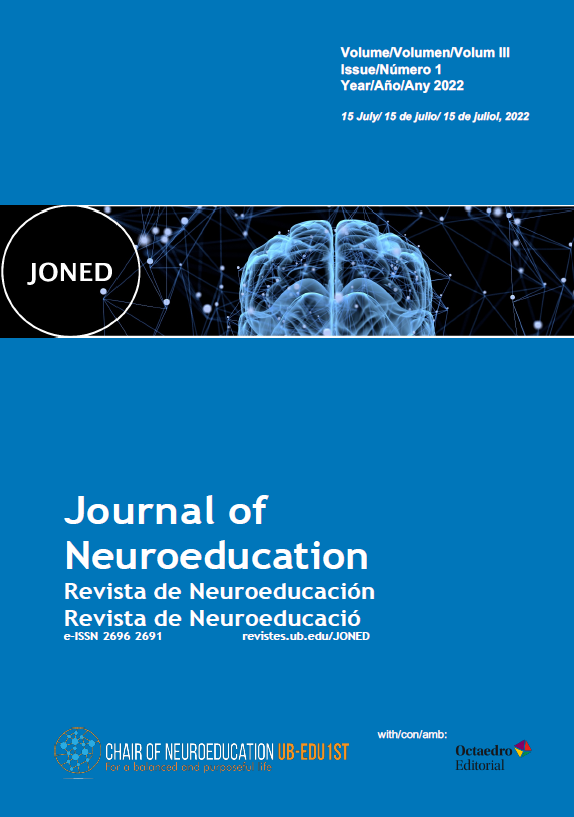¿De qué hablamos cuando hablamos de metacognición en el aula?
Palabras clave:
metacognición, aprendizaje autorregulado, monitoreo y control, enseñanza, educaciónCitas
Flavell JH. Metacognitive Aspects of Problem Solving. In: Resnick , L. B., editors. The Nature of Intelligence; Erlbaum. 1976: 231-236.
Flavell JH. Metacognition and cognitive monitoring: A new area of cognitive-developmental inquiry. American Psychologist. 1979;34(10):906–11. Available from: http://content.apa.org/journals/amp/34/10/906
O’reilly F, Chande R, Groot B, Sanders M, Soon Z. Behavioural Insights for Education A practical guide for parents, teachers and school leaders. London; 2017.
Salles A, Ais J, Semelman M, Sigman M, Calero CI. The metacognitive abilities of children and adults. Cognitive Development. 2016;40:101–10.
Nelson TO, Narens L. Metamemory: A Theoretical Framework and New Findings. Psychology of Learning and Motivation - Advances in Research and Theory. 1990;26(C):125–73.
Flavell JH. Development of children’s knowledge about the mental world. International Journal of Behavioral Development. 2000;24(1):15–23. Available from: http://www.tandf.co.uk/journals/pp/01650254.html
Lyons KE, Ghetti S. The Development of Uncertainty Monitoring in Early Childhood. Child Development. 2011;82(6):1778–87.
Coughlin C, Hembacher E, Lyons KE, Ghetti S. Introspection on uncertainty and judicious help-seeking during the preschool years. Developmental Science. 2015;18(6):957–71.
Ghetti S, Hembacher E, Coughlin CA. Feeling uncertain and acting on it during the preschool years: A metacognitive approach. Child Development Perspectives. 2013;7(3):160–5.
Roebers CM. Executive function and metacognition: Towards a unifying framework of cognitive self-regulation. Vol. 45, Developmental Review. Mosby Inc.; 2017. p. 31–51.
Schneider W. The development of metacognitive knowledge in children and adolescents: Major trends and implications for education. Vol. 2, Mind, Brain, and Education. 2008. p. 114–21.
Lai ER. Metacognition: A Literature Review Research Report. Always learning: Pearson Research Report. 2011. Available from: http://www.pearsonassessments.com/research.
Son LK, Kornell N. The virtues of ignorance. Vol. 83, Behavioural Processes. 2010. p. 207–12.
Hacker DJ, Bol L, Horgan DD, Rakow EA. Test prediction and performance in a classroom context. Journal of Educational Psychology. 2000;92(1):160–70.
Sinkavich F. Performance and metamemory - Do students know what they don′t know? Journal of Instructional Psychology. 1995;22(1):77–87.
Dunlosky J, Rawson KA. Overconfidence produces underachievement: Inaccurate self evaluations undermine students’ learning and retention. Learning and Instruction. 2012;22(4):271–80.
Metcalfe J, Kornell N. Principles of cognitive science in education: The effects of generation, errors, and feedback. Psychonomic Bulletin & Review. 2007;14(2):225–9. Available from: http://link.springer.com/10.3758/BF03194056
Schneider W, Visé M, Lockl K, Nelson TO. Developmental trends in children’s memory monitoring: Evidence from a judgment-of-learning task. Cognitive Development. 2000;15(2):115–34. Available from: https://linkinghub.elsevier.com/retrieve/pii/S0885201400000241
Schneider W, Lockl K. Procedural metacognition in children: Evidence for developmental trends. In: Handbook of Metamemory and Memory. 2013.
Metcalfe J, Kornell N. Principles of cognitive science in education: The effects of generation, errors, and feedback. Psychonomic Bulletin & Review. 2007;14(2):225–9. Available from: http://link.springer.com/10.3758/BF03194056
Kornell N, Son LK. Learners’ choices and beliefs about self-testing. Memory. 2009;17(5):493–501.
Carroll M. Metacognition in the classroom. In: Dunlosky J, Bjork RA, editors. Handbook of Metamemory and Memory. Psychology Press; 2013. p. 411–27.
Destan N, Roebers CM. What are the metacognitive costs of young children’s overconfidence? Metacognition and Learning. 2015;10(3):347–74.
Bransford J, Sherwood R, Vye N, Rieser J. Teaching thinking and problem solving: Research foundations. American Psychologist. 1986;41(10):1078–89. Available from: http://doi.apa.org/getdoi.cfm?doi=10.1037/0003-066X.41.10.1078
Schneider W, Pressley Michael. Memory Development Between Two and Twenty. 2nd ed. New York, NY: Psychology Press; 1997. Available from: https://www.taylorfrancis.com/books/9781134802623
Dawson TL. Metacognition and learning in adulthood. 2008.
Education Endowment Foundation. Metacognition and self-regulation. London; 2021 [cited 2021 Oct 25]. Available from: https://educationendowmentfoundation.org.uk/education-evidence/teaching-learning-toolkit/metacognition-and-self-regulation
Boekaerts M. Self-regulated Learning at the Junction of Cognition and Motivation. European Psychologist. 1996;1(2):100–12.
Lockl K, Schneider W. Developmental trends in children’s feeling-of-knowing judgements. International Journal of Behavioral Development. 2002;26(4):327–33.
Schraw G. Promoting general metacognitive awareness. Instructional Science. 1998;26(1–2):113–25.
Simpson ML, Nist SL. An update on Strategic Learning: It’s More than Textbook Reading Strategies. Vol. 43, Source: Journal of Adolescent & Adult Literacy. 2000.
Vandevelde S, van Keer H, Schellings G, van Hout-Wolters B. Using think-aloud protocol analysis to gain in-depth insights into upper primary school children’s self-regulated learning. Learning and Individual Differences. 2015;43:11–30.
Whitebread D, Coltman P, Pasternak DP, Sangster C, Grau V, Bingham S, et al. The development of two observational tools for assessing metacognition and self-regulated learning in young children. Metacognition and Learning. 2009;4(1):63–85.
Quigley, A., Mujis, D., Stringer E. Metacognition and self-regulated learning. Guidance Report. London; 2018.
Descargas
Publicado
Número
Sección
Licencia
Derechos de autor 2022 Julieta Goldstein, Cecilia Inés Calero

Esta obra está bajo una licencia internacional Creative Commons Atribución-NoComercial 4.0.
Los autores que publican en esta revista aceptan los siguientes términos:
a. Los autores conservan los derechos de autor y otorgan a la revista el derecho de la primera publicación.
b. Los textos se publicarán bajo una Licencia de Atribución No Comercial Creative Commons que permite a otros compartir el trabajo, siempre que incluyan un reconocimiento de la autoría del trabajo, su publicación inicial en esta revista y los términos de la licencia, y no se haga un uso comercial.



